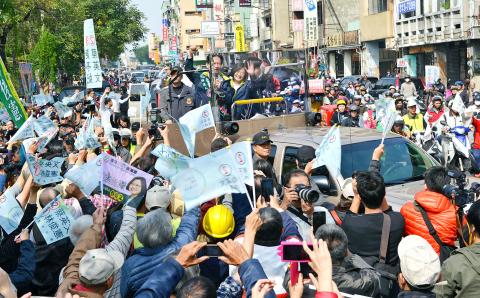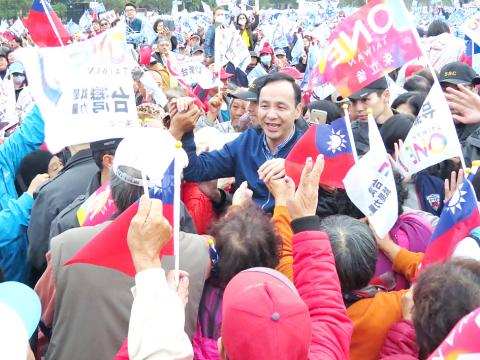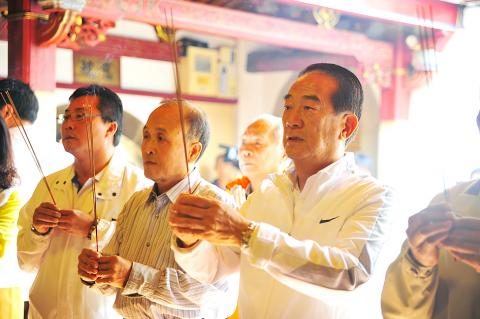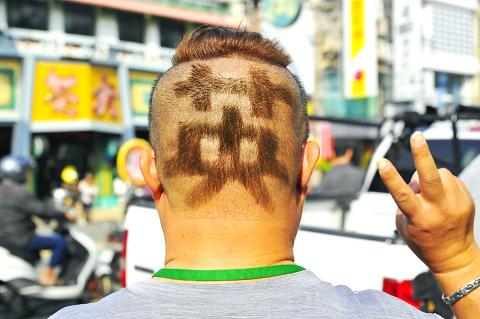The three presidential candidates’ campaigns converged in Tainan yesterday — “Super Sunday,” the last weekend day of the campaign before Saturday’s elections — where they took part in motorcades, rallies and campaign events in bids to woo southern voters.
Chinese Nationalist Party (KMT) presidential candidate Eric Chu (朱立倫) yesterday morning toured the city, a traditional pan-green stronghold, in a motorcade from Yongkang District (永康) before an evening rally in Anping District (安平).
Democratic Progressive Party (DPP) presidential candidate Tsai Ing-wen (蔡英文) began her campaign events by visiting the Kaitai Tianhou Temple (天后宮) in Anping District in the morning.

Photo: Sam Yeh, AFP
Her motorcade then toured the city, traveled to Chiayi for another street procession and then returned to Tainan for a nighttime rally.
The campaign trail of People First Party presidential candidate James Soong (宋楚瑜) saw him arrive in Tainan at about noon, where he visited Chenghuang Temple (城隍廟) before traveling to Kaohsiung, where he attended a rally and led a motorcade through the municipality.
The Tainan Police Department said Chu and Tsai’s motorcade routes through the city were plotted to avoid each other.

Photo: Tsai Wen-chu, Taipei Times
A total of 890 police officers were deployed to enhance safety and prevent traffic congestion, the department said.
It had not issued orders to cancel police vacations, while individual precincts were responsible for their duty rosters, the department said.
Citing public safety concerns, the police department, prior to the candidates’ arrival in Tainan, called on the public to refrain from lighting firecrackers, jaywalking or rushing toward motorcades.

Photo: Wang Chieh, Taipei Times
Tainan Mayor William Lai (賴清德) said that Super Sunday this year was “especially ‘super’ for Tainan, as it was the first time that Chu, Tsai and Soong — as presidential candidates — had been in the city on the same day.”
The candidates’ routes had been studied by a city government task force ahead of time to avoid them running into each other, Lai said.
Things that were planned ahead of time included finding out where street processions would overlap and scheduling convoys to pass those intersections at different times, he said.

Photo: Wang Chieh, Taipei Times
“Everyone is a welcomed guest in Tainan and the city government has the duty to ensure the safety of every candidate,” said Lai, who is a member of the DPP.

‘TAIWAN-FRIENDLY’: The last time the Web site fact sheet removed the lines on the US not supporting Taiwanese independence was during the Biden administration in 2022 The US Department of State has removed a statement on its Web site that it does not support Taiwanese independence, among changes that the Taiwanese government praised yesterday as supporting Taiwan. The Taiwan-US relations fact sheet, produced by the department’s Bureau of East Asian and Pacific Affairs, previously stated that the US opposes “any unilateral changes to the status quo from either side; we do not support Taiwan independence; and we expect cross-strait differences to be resolved by peaceful means.” In the updated version published on Thursday, the line stating that the US does not support Taiwanese independence had been removed. The updated

‘CORRECT IDENTIFICATION’: Beginning in May, Taiwanese married to Japanese can register their home country as Taiwan in their spouse’s family record, ‘Nikkei Asia’ said The government yesterday thanked Japan for revising rules that would allow Taiwanese nationals married to Japanese citizens to list their home country as “Taiwan” in the official family record database. At present, Taiwanese have to select “China.” Minister of Foreign Affairs Lin Chia-lung (林佳龍) said the new rule, set to be implemented in May, would now “correctly” identify Taiwanese in Japan and help protect their rights, the Ministry of Foreign Affairs said in a statement. The statement was released after Nikkei Asia reported the new policy earlier yesterday. The name and nationality of a non-Japanese person marrying a Japanese national is added to the

AT RISK: The council reiterated that people should seriously consider the necessity of visiting China, after Beijing passed 22 guidelines to punish ‘die-hard’ separatists The Mainland Affairs Council (MAC) has since Jan. 1 last year received 65 petitions regarding Taiwanese who were interrogated or detained in China, MAC Minister Chiu Chui-cheng (邱垂正) said yesterday. Fifty-two either went missing or had their personal freedoms restricted, with some put in criminal detention, while 13 were interrogated and temporarily detained, he said in a radio interview. On June 21 last year, China announced 22 guidelines to punish “die-hard Taiwanese independence separatists,” allowing Chinese courts to try people in absentia. The guidelines are uncivilized and inhumane, allowing Beijing to seize assets and issue the death penalty, with no regard for potential

‘UNITED FRONT’ FRONTS: Barring contact with Huaqiao and Jinan universities is needed to stop China targeting Taiwanese students, the education minister said Taiwan has blacklisted two Chinese universities from conducting academic exchange programs in the nation after reports that the institutes are arms of Beijing’s United Front Work Department, Minister of Education Cheng Ying-yao (鄭英耀) said in an exclusive interview with the Chinese-language Liberty Times (the Taipei Times’ sister paper) published yesterday. China’s Huaqiao University in Xiamen and Quanzhou, as well as Jinan University in Guangzhou, which have 600 and 1,500 Taiwanese on their rolls respectively, are under direct control of the Chinese government’s political warfare branch, Cheng said, citing reports by national security officials. A comprehensive ban on Taiwanese institutions collaborating or